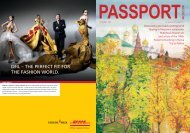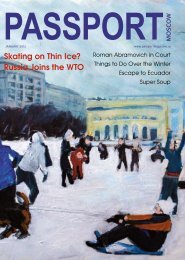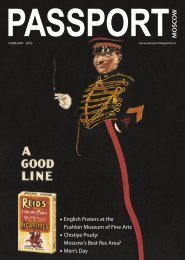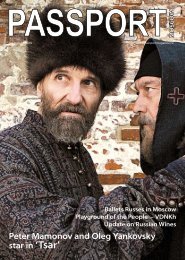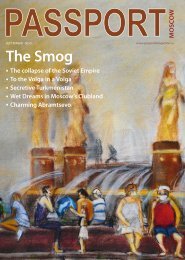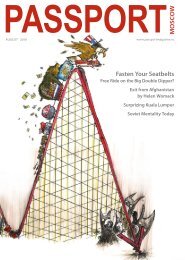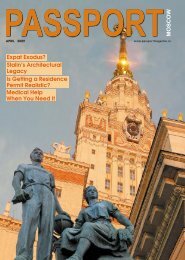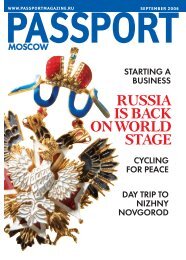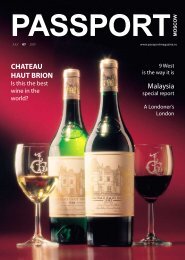M O S C O W Interview with Leonid Shishkin - Passport magazine
M O S C O W Interview with Leonid Shishkin - Passport magazine
M O S C O W Interview with Leonid Shishkin - Passport magazine
You also want an ePaper? Increase the reach of your titles
YUMPU automatically turns print PDFs into web optimized ePapers that Google loves.
Travel<br />
Moscow and<br />
Maya Rusanova<br />
artwork by Julia Nozdracheva<br />
St. Petersburg is well worth a visit at any time of the year. Especially<br />
in the summer when you can ‘гулять’ (walk) all night<br />
long, as although the sun sets, the night never really begins.<br />
Take a weekend off, and enjoy this superb city which is so different<br />
from Moscow. When you go there, it may be useful to<br />
know that there is real competition between St. Petersburg<br />
and Moscow, just as there is between Edinburgh and Glasgow,<br />
or Washington and New York, to name but a few examples<br />
Officially the capital of Russia is Moscow. However St. Petersburg<br />
is often called the Northern Capital. This isn’t by chance.<br />
These two cities came to prominence at separate times, and<br />
they have been competing <strong>with</strong> each other for 300 years, beginning<br />
in 1703, when Emperor Peter the Great founded St. Petersburg<br />
on the banks of the river Neva.<br />
The reason for the confrontation lies in the fact that St. Petersburg<br />
was originally built to be exactly what is: the opposite<br />
of Moscow. Moscow is the embodiment of the Russian city; St.<br />
Petersburg of the European city. This is evident in architecture,<br />
fashion and even language. In the 18 th century, French was<br />
more popular than Russian in the upper classes in St. Petersburg,<br />
and the city became a ‘window to Europe’, just as Peter<br />
the Great planned.<br />
Moscow’s history stretches back a lot longer than St. Petersburg’s,<br />
all the way back to 1147. Moscow grew organically and<br />
sporadically; it was built on the confluence of important trading<br />
routes. The original settlement was a small village. To this<br />
day, citizens of St. Petersburg still tease Moscow citizens, calling<br />
Moscow a ‘big village’, which in many respects it is.<br />
St. Petersburg was a capital from birth, something that Muscovites<br />
resent; they suddenly became provincials when Peter the<br />
Great moved the capital there in 1712. However St. Petersburg<br />
managed to prove its superiority in some things. The newest<br />
trends in fashion, architecture, drawing, music and literature ap-<br />
1 June 2010<br />
peared in the northern capital first, and only reached Moscow<br />
some time later. Even when the capital was moved back from<br />
Leningrad, as St. Petersburg was known then, to Moscow after<br />
the Bolsheviks came to power, in 1918, the city was still considered<br />
the cultural capital of Russia. Many Muscovites will debate<br />
this. Take rock music. In the 1980s St. Petersburg spawned many<br />
leading rock groups. Aquarium, Kino were from St. Petersburg,<br />
whereas Mashina Vremeni and Zvuki Mu were from Moscow.<br />
Whether Moscow or St. Petersburg music was better or worse,<br />
was a heated topic for most young people.<br />
Moscow is faster, more hectic and business-like. In the 18-<br />
19 th centuries, however, St. Petersburg was also very bustling<br />
as a capital city should be. Much dancing and many sumptuous<br />
dinner parties took place. The city was full of merchants,<br />
the streets of the city were full of shops, cabs and people. Today<br />
St. Petersburg lives calmly and measuredly. In Moscow, for<br />
example, people run down the elevator; in Petersburg people<br />
ride on it. Muscovites seem brusque and impolite to citizens<br />
of St. Petersburg. If you ask somebody the way in St. Petersburg,<br />
locals may not only give you directions, they may take<br />
you for a mini-excursion around the city. People in Moscow<br />
aren’t often able to do that, many are often visitors like you.<br />
In Petersburg one doesn’t need to hurry. The city is much<br />
smaller than Moscow. There a person wants to walk, not run,<br />
although Muscovites don’t walk, they take cabs or the Metro<br />
during the long winter. Muscovites accuse St. Petersburg of being<br />
depressing, because the pace of life is too slow. This is partly<br />
because of the climate. St. Petersburg lies much further north<br />
and the city is very wet and windy. Muscovites often catch cold<br />
after visiting St. Petersburg. The sun rarely warms the citizens<br />
of Petersburg, because of high humidity.<br />
Moscow is sunnier, and that’s why it seems smarter, than<br />
Petersburg. But there is an eclecticism that is peculiar to<br />
Moscow. An antique building and a glass skyscraper can be<br />
neighbours in Moscow, but not in St. Petersburg. That’s why<br />
citizens of St. Petersburg say that the Muscovites don’t have a



